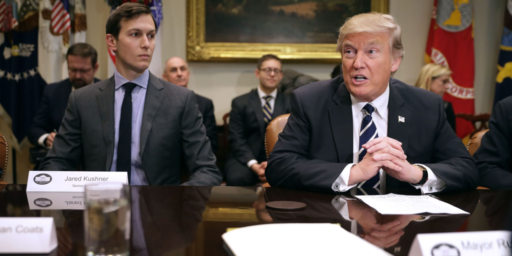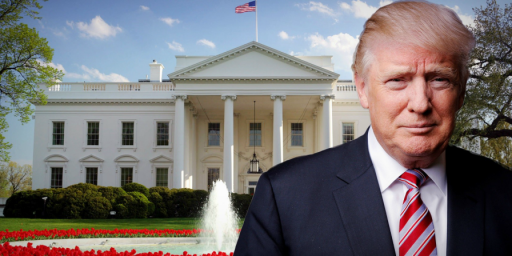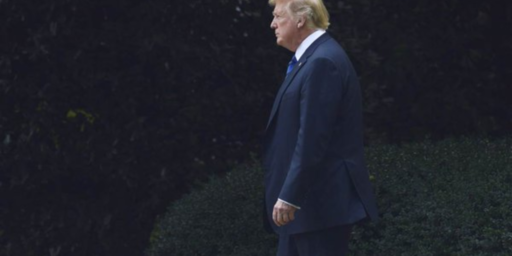Warner: We Need Revolution in Security Clearances
Senator Mark Warner, Vice-Chairman of the Select Committee on Intelligence, says, "We Need Revolution, Not Just Evolution" in Security Clearances."
Senator Mark Warner, Vice-Chairman of the Select Committee on Intelligence, has a piece at The Cipher Brief titled, “We Need Revolution, Not Just Evolution” in Security Clearances.”
The recent announcement by the Government Accountability Office that the personnel security clearance process is back on its “high risk” list affirms what the national security community has known for the last several years: the current process is broken.
The U.S. government requires a well-functioning system for granting security clearances to make sure we have a workforce who can be trusted with our nation’s secrets. But the current system, born in the wake of World War II, when classified documents lived on paper and Telex, is simply too time-consuming, too expensive and too complex.
[…]
The clearance backlog and continued difficulty transferring a security clearance between federal agencies cost taxpayers millions, as intelligence and national security professionals must twiddle their thumbs for months after they are hired waiting for their clearance to come through. Too often, recently-vetted staff must start the process from scratch if they move to a job with a different agency or on a different contract.
Because many agencies and the companies that support them are located in my home state of Virginia, I’ve seen firsthand how these inefficiencies impact government personnel and contractors alike, undermining our ability to attract quality talent and field a reliable and trusted workforce in a timely manner.
I’ve also heard directly from national security professionals on the front lines about how we can fix our broken clearance system. Some issues can be improved with just a little bit of common sense: in the digital age, do we still need to conduct in-person interviews of an applicant’s neighbor? Are there better ways to anticipate who may become a security risk beyond simply having foreign relatives or living overseas? Can we continuously evaluate people’s trustworthiness rather than conducting a full reinvestigation every five or ten years?
While he correctly identifies the problem, he’s sketchy on the solution:
As Vice Chairman of the Senate Intelligence Committee, I believe our committee has an important part to play, given our role in ensuring proper protections for our nation’s most sensitive information. The Director of National Intelligence, as the government’s Security Executive Agent, has a special perch to drive change. With our partners on Capitol Hill and across the executive branch, there is a window today to bring personnel vetting into the 21st century.
We face a unique opportunity to radically improve how we recruit and vet personnel to support sensitive government missions. And while the threats and challenges to the national security workforce are palpable, technology can allow us to gather information about individuals applying for access to our nation’s secrets much more readily, while still respecting their privacy.
But to get to the finish line, it will require more than a restating of the problem. We need a focused willingness from all stakeholders to commit the time, the political capital, and yes, the funding necessary to finally modernize our nation’s security clearance process.
That literally tells us nothing about what the “revolution” will look like. One suspects, however, that it will be televised.






Oh gods yes.
I was a contractor for Agency A, my clearance held by them. When an opportunity arose to become a federal employee for Agency B, I jumped at it. But Agency B did not recognize Agency A’s clearance, even though it was the same level and had been granted using pretty much the same processes. So I had to start from scratch. It took almost eight months.
This was, needless to say, very frustrating, and bore some risk, because partway through the process Agency B had to interview my supervisors at my Agency A contractor job. Fortunately they didn’t dump me on the spot and I was able to continue working for them until Agency B finally finished my clearance.
The funniest part was that everyone involved agreed the whole thing was stupid. Why not just transfer my clearance, let me give my two weeks notice, and start me at Agency B? Nobody really knows.
My recent experience probably helps explain why there is such a backlog. While I was active duty I had a top-secret clearance. Since retiring and moving to the civilian side 4 years ago I worked in jobs that only required a secret clearance. Last year when I moved to Oklahoma they decided that that I needed a different type of secret clearance geared towards civilians … okay, sure. By the time they got around to interviewing me, I had already accepted a new job in Texas, which doesn’t even need a secret clearance. I told the first investigator this when she contacted me. After checking with whoever her higher ups are I was told that they had to proceed anyway. That initial interview took almost 4 hours. I swear, for my top-secret clearance 5 years earlier I talked to the agent for all of about 20-30 minutes. Then the fun really started. I ended up having two more longish sessions with that investigator and then another meeting with a different person once I got to my new job in Texas. All-in-all they put an awful lot of time and effort into investigating someone who is:
A) Not a security risk (most of their follow-up questions were about the online college credits the Air Force gave me, and some of my wife’s relatives in a foreign country who I didn’t list on the form because I’ve never met or talked to them)
B) Will likely never see or handle classified documents again anyway.
I’m still baffled by the whole thing.
[side-eyes Jared Kushner]
This is a wide-ranging issue. Perhaps we should start with legally preventing someone who cannot pass the background investigation, and who omitted 100 foreign contacts on SF-86, and had to revise his financial disclosure forms three times from having access to sensitive information and from serving the President.
It’s a small step, but I’d totally be on board with that as the first incremental change to procedure.
—
GODAMMIT! Even ignoring nepotism policies, why the hell is it okay for Kushner to serve in his role?
http://www.newsweek.com/jared-kushner-security-clearance-white-house-access-ivanka-donald-trump-723993
With all due respect to Sen. Warner, he doesn’t really know what he’s talking about.
As a recent security manager (as of a year ago) with the DoD who held a TS clearance for almost 1/2 century, I’m very familiar with the process and issues.
The first thing to understand is that the security clearance investigation process was centralized under OPM several years ago. It doesn’t reside with the agencies anymore and it’s gotten much better than what it was, but still has a long way to go. A lack of investigative resources and, frankly, personnel who provide incomplete or incorrect information, also gum up the works.
Periodic Reinvestigations are necessary because not everything of potential security concern can be captured through a “continuous evaluation” process. And – here’s a shocker – most people don’t self-report the information they’re supposed to (ie. a bankruptcy or divorce).
The problem is really adjudication, which still takes place with the individual agencies. Adjudication standards are different and those standards require different types of investigations, so moving to another agency does sometimes require a new, different type, of investigation to meet that agency’s adjudication standard.
So the problem isn’t the investigation process – the problem is a lack of consistency when it comes to adjudication standards across different agencies. Most of this problem could be solved by standardizing adjudication criteria so that an adjudication with one agency is directly transferable to another agency.
Additionally, the government should use one system for the transfer and processing of clearance information – as it stands different agencies use different systems. They should just standardize on JPASS.
Except there are interim clearances. The only reason someone should be sitting around twiddling their thumbs is if there was a red flag in their submitted paperwork or initial records pulls that would preclude granting someone an interim clearance. Before I quit my job last year, I could get an interim TS clearance within 2 weeks after the paperwork was submitted. The biggest bottleneck for me was getting people to actually fill out the clearance paperwork completely, accurately and correctly. A better online system for that could be really beneficial.
That is still a good indicator, but, I hate to say it, they need to look a lot more closely at digital and social media. The releases people currently sign to allow OPM to look at financial, criminal and other databases should include authorization to look at social media as well.
Finally, since most of the process is governed by Executive Order, President Trump can reform most of the process without significant input from Congress. He could create a standard set of adjudication criteria and mandate their use across the Executive branch. He could mandate one system for tracking and adjudication, etc. That would solve a lot of the issues Sen. Warner identifies.
Unfortunately our Presidents in recent decades seem completely uninterested in Executive Branch reform so maybe Congress does need to step in.
@Todd:
Your security manager dropped the ball. When you left that job, they should have canceled your investigation or, if you were going to another job that required a clearance, transferred your investigation to the other agency. As long as the clearance investigation request is in OPM’s system, the HAVE to do the investigation.
This reminds me of another problem – in many places the security manager position is an additional duty. That means that training and focus on that aspect is not good. The process all around could be much improved by sourcing dedicated security managers who actually know what they are doing.
This is an example of the adjudication problem detailed in my comment. There are, if I remember correctly, three different investigations for a SECRET clearance depending on the sensitivity of the position. OPM had begun to merge these when I left into a single investigation so this should be less of an issue going forward.
@de stijl:
The question is: Who adjudicated Kushner’s clearance?
Yes, it is a total mess. My employer maintains my TS clearance just in case they get a contract and need to have warm bodies immediately available. I haven’t needed a TS or even a Secret in several years (and BTW my “need” was marginal at best) but if my clearance lapses, then it would take over a year to reinstate. Any solution should include solving the over classification issue and perhaps allowing clearance holders to put their clearances in some kind of dormant mode and rapidly reinstate when the need arises.
@Andy: Kushner still has an interim clearance. He probably shouldn’t even have that, but he does.
I’d love to be a fly on the wall if he ever gets poly’d. Hoo boy.
@Andy:
There’s a balancing act needed here. On one hand, the government needs sufficiently visibility of a person’s life to make sure they’re worthy of a clearance. On the other hand, they compete with private business for labor, and if the clearance process becomes to intrusive, they’re liable to have difficulty attracting good workers.
The other question is, does having access to someone’s social media accounts actually provide useful information? Or does it just provide a lot of noise that creates a lot of work without any real benefit? e.g. was Edward Snowden talking with his conspirators on Facebook?
Worse, would it allow candidates to be eliminating based on the bias of the investigator rather than actual risk? e.g. this guy called Trump a moron on twitter, clearly they’re part of a deep state conspiracy
@Stormy Dragon:
Yes, there definitely needs to be a balance – but this is the 21st century and social media and our digital lives are only growing bigger and more important. We can’t ignore it when evaluating people for security clearances.
@Mikey:
It was a bit of a rhetorical question.
The President is the last word when it comes to adjudication and if he wants someone to have a clearance or access to classified info then he has complete authority to make it happen.
@Andy: Agency B asked me for all my social media names. Not the passwords but enough to look at whatever I had available publicly.
@Andy: I know, I’m just a bit miffed the President can just grant access to a guy who normally wouldn’t be allowed within an astronomical unit of a security clearance.
@Mikey:
A lot of things trump security (see what I did there?) including Constitutional prerogatives. Hard to see how a President can be restrained in a process he or she controls.
@Mikey: Yeah, I’ve heard from friends they look at public profiles now. That will help catch the dumb ones at least.
@Andy:
Sure they can ignore it. The question of whether they should or shouldn’t depends on if it actually provides usefully predictive information or not. Simply adding more information to the investigation process without any evidence that the information is useful for making a decision just leads to analysis paralysis.
The question is whether the investigations following recent breaches turned up any social media indicators that could have identified them in advance. Maybe they did, and maybe they didn’t. I don’t know, but it shouldn’t be assumed as a given that they did.